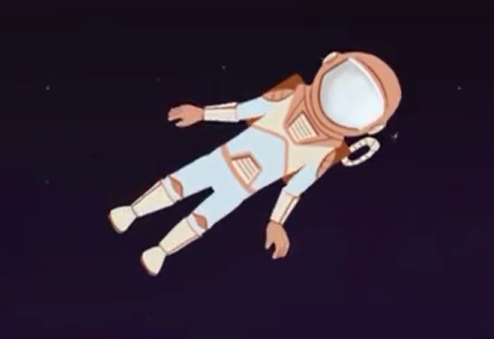Some of the issues that are important if you want to have people in space for long periods of time.
如果人類想長期置身太空,有幾個重要的問題不得不考慮。
One is that people will tend to lose bone and muscle mass.
其中之一就是骨質疏松與肌肉萎縮。
We know this. If you have to put a cast on your leg, and you take the cast off after a few weeks, you'll see that your muscles have shrunk in size.
我們都知道,如果你的腿打上石膏,幾周之后取下石膏后,你會看到肌肉體積萎縮了。
And if you measured the bone strength, you'd also see that might have gone down a little bit, too.
并且如果你測量骨骼的強度,也將看到些許下降。
And so, it's very interesting that our body has that ability to adapt to the loads that are put on it, so that bones and muscles aren't static, they're always changing.
而且相當有意思的是,我們的身體可以適應加在之其上的負重,所以我們的骨骼和肌肉不是永恒不變的,它們在不停發生變化。
While we think of bone as being a solid thing that doesn't change very much, it changes too.
即使我們認為很牢靠的骨骼并不怎么變化,但其實它也會變化。
And it turns out that in weightlessness, you lose bone.
事實上,在失重狀態下骨質會發生流失。

And then you also cause the muscles that work against gravity, what are called the postural muscles, they'll start to shrink and lose strength.
并且我們用以對抗重力的“姿勢肌肉”也會開始萎縮并失去力量。
There are other things in the cardiovascular system, the heart and blood vessels.
再來看看心血管系統:心臟及血管。
And if you think about it, standing up in gravity means you have to work against gravity in order to keep blood pumping to your head.
你想象一下,你在重力環境下站起來就必須對抗重力,以保證血液流向大腦。
So, if you couldn't keep blood pumping in the head, you'd pass out every time you stood up because when you're lying down, you don't have to push against gravity.
所以,如果你不能保證血液流向大腦,你每次躺下后起身會就感到頭暈,這是因為你躺下來的時候不需要對抗重力。
But when you stand up, you got to work against gravity to keep blood flowing to your head.
但是當你站起來的時候,你必須再次對抗重力以保障血液流向你的大腦。
And your heart and blood vessels have a really nicely worked-out system to make that happen every time.
每當上述情況發生,你的心臟和血管有一套自發的應付機制。
But that system can also change in weightlessness.
但是在失重條件下,這套機制也會變化。
And then the other area that changes is the system that has to do with balance.
另一個會發生變化的地方就是平衡系統。
Again, maintaining your balance is something that you're doing against gravity, right?
同樣的,保持平衡是在重力環境下做的事情,對吧?
If you didn't have gravity present, you wouldn't have to worry about falling.
如果沒有重力存在,我們也不用擔心跌倒了。
But you obviously do have to worry about falling, and we have a very highly developed sense of balance to keep us upright and to prevent us from falling.
但是很明顯你需要擔心跌倒,并且我們已經有相當發達的平衡感知,使得我們保持直立并防止跌倒。
And when you see what skaters do, you realize just how exquisite a system it is.
而且等你看過別人玩滑板之后,你就會意識到這個系統有多么精妙了。
But when you go into weightlessness, your balance system changes.
但是當你進入失重環境時,你的平衡系統跟著變化。
You don't really notice it while you are in weightlessness, but when you come back, you do notice it, that your balance has changed and you have a little bit of trouble maintaining your balance.
在失重狀態下你可能無法意識到這一點,但當你回到正常狀態時,就會注意到你的平衡能力已經發生改變,這時候想保持平衡就會有點兒困難了。
And what it shows is that while you're in space, your brain is trying to allow you to function in weightlessness.
當你置身太空時,大腦會設法讓你在失重環境下活動。
And so, it re-adapts you to be weightless, which you don't notice until you come back and find out that you're now back on Earth with a balance system that's been adapted to space.
這樣,你再次適應了失重環境,直到你回到正常狀態之前才會意識到這些,落地之后你會發現你的平衡系統已經適應了太空環境。


